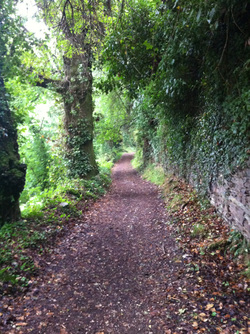 See photo gallery.I took the alternate route (an extra six and a half kilometers) to Sarria this day in order to see the monastery in Samos. I only was able to see the monastery's exterior, however, because, by mid-day, all of the refugios in Samos had filled, and I wound up taking an out-of-town guest house that was located about three kilometers beyond Samos. After I had made the arrangements to stay at the guest house, which was owned by the Val de Samos albergue owner's in-laws, I went to a cafe, had a cafe con leche, and ordered a bocadillo con jamon y queso. I ate a few bites of the sandwich then wrapped it to go and went to a market, where I purchased soap, shampoo, grapes, a litre of Coke, and a Rosado Tempranillo to take to the house. When I arrived at the little house, the owner's wife and sister-in-law, both named Pillar, were in the backyard with the owner's toddler niece. One of the Pillars showed me the guest house and put fresh sheets and blankets on the bed. At first I was so happy to get to sleep without a hundred strangers and without being afraid I was going to roll off of a top bunk, but, after awakening from a terribly realistic nightmare in which the man who owned the house broke in and attacked me, I decided never to go off of the Camino grid again. Since O'Cebreiro, I have been on the stretch of the journey where people pile onto the Camino in order to walk the portion that is required for them to get their Compostela. Therefore, I can expect filled albergues from here on out. ("Oh, joy," says the incapable-of-racing one.) On a positive note, I finally found a bank from which I was able to withdraw euros. Whew!
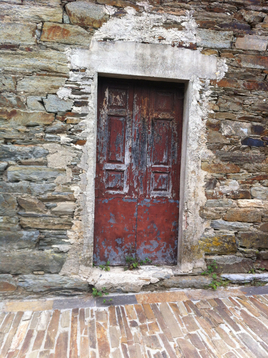 See photo gallery.I got out of the albergue by 8:30. I took my time and enjoyed slowly packing my sack and rolling my sleeping bag. The cafe was open, so I slowly imbibed my cafe-con-leche elixir. Outside the cafe, I chatted with a fortyish steel-gray-haired Spanish male bicyclist who encouraged me to wear a jacket and uttered his excitement about getting to ride the next twelve kilometers all downhill. Before shuffling eleven hundred songs on my IPhone, I talked a bit more with two timid German women and a gray-haired Dutch woman with knotted veins behind her dark-tanned knees. I then set off on my way past the in-town barn with its grumpy belled cows and scampering kittens. Over the next several hours, the French teen scouts and I leap-frogged down the fern-rose-peony-clover-and-ivy-covered mountain. (Okay, so they did most of the leaping.) I skinned my hand when the weight of my backpack caused me to somersault backwards down a hill as I squatted to, er, well, squat. I bought an overpriced braided bracelet from a twelve-year-old girl at her Felicia-style card table as well as purchased sour raspberries, boysenberries, and gooseberries from someone's backyard for one euro; and I, once again, was frightened by a herd of bulls. In Tricastela, I spent too long in the Iglesia, where the priest gave me a special paper in English with remarks specific to particular prayers I had been praying and other thoughts I had been thinking. He had seen me cry as I read it, had clasped my wet-with-holy-water hand when I left, and had said, " Bien. Bien." By the time I came out of the church, all of the Tricastela albergues were completo (full), and I had to walk on another five kilometers to find the next albergue. My foot did pretty well with medication. It was through for the day by Tricastela, but I had to walk on. I took more medication and waited a while for it to kick in before going on to San Cristobo and Fort Lusio. I had planned to take an alternate route from Tricastela to Sarria via Samos the next day to visit the Benedictine monastery in Samos, which is one of the oldest and largest in Spain. However, with the Tricastela inns full, I had to begin the alternate route right then. The road I embarked on was said to be a dangerous stretch of highway. What a surprise awaited me at Fort Lusio-- well worth the extra time and miles. The walk to San Cristobo was comfortable. Those days of 105 degree struggles seemed to be behind me. It was a cool walk with new fauna, a pretty river to the left with tall trees. I walked along the very highway that I had read about in Hape Kerkeling's book, which I had been quite scared to walk along. Maybe it was a difference in traffic flow due to the the time of day that I was traveling versus the time when he had traveled it, or maybe it had been redesigned since he had written his book, but it was not too frightening. No close calls. The scariest part was, not cars traveling dangerously close to me, but having to walk on the other side of a guard rail with a steep drop-off to moving water below. The walk did not take long, and the medicine boost carried me well. About 3:00, I reached San Cristobo, though I was alarmed a bit by the sight of the town. There was one place that said it had rooms, but I did not like the looks of it. I hoped that it was not the Lucio albergue. I continued on, having decided that, if I had to walk another six-point-six kilometers on to Samos, I would do so rather than stay there. I walked about a quarter mile, through beautiful woodlands-- the kind where the trees grow together overhead like leaf-ceilings. To my delight, not far ahead, the path forked with the right prong signed for Samos and the left for the albergue. I took the left. The way narrowed. It passed a field and came to a bridge. The slope up to the bridge was covered in thick straw. I sank to my knees in the damp straw as I stepped onto the bridge. I knew I was getting close and was excited to discover what would be ahead in the bushes. Having gotten across the bridge, I continued to ascend the path, only to find a highway at the top. "A L B E R G U E" in spray-painted letters with a big yellow arrow were splayed on the road. I waited for three groups of bicyclists to whiz by then limped to the other side. A shower, rest, and hopefully food was nearer with each of my off-kiltered steps. As I came around the last curve, I paused to laugh at a chicken pecking a weed on the roadside. I looked up and saw "A-L-B-E-R-G-U-E" spray-painted across the back of a road sign. Turning the corner, I went up this last street, laughing at more chickens. I looked down a narrow way to my right and saw a very small gray haired man in his yard outside his door. He was saying something to me and dramatically pointing. I pulled my ear buds out and cocked my head. He repeated his Galician message and pointed to what I thought was a church. He waved his arms toward it, and I realized that it was the albergue. Looking closer, the edifice looked more like a castle than a church. Actually it had been a fort. Fort Lucio. It was my refuge-- except that the doors were locked. I felt like Dorothy knocking on the door at the Emerald City. The massive door had an opened wooden rectangle in its upper third. I reached through the opening and unlatched the door from its inside. Entering, I found a brown-haired girl with glasses behind a desk. I asked if she had a bed; she nodded. She stamped my Pilgrim's Passport, then wrote my name, country, and passport number in the registry. She collected five euros from me then had me remove my boots and place them on a shelf. She showed me the laundry area and the women's showers and then took me upstairs to the dormitory, which had bunkbeds for twenty-two with nine folks already bedded. Mine was bed ten, a top bunk with half a rail on one side and none on the other. I quickly asked God to keep me from falling off, then asked her if there might be a place I could find food. She asked me if I liked tortilla con potatas. I nodded and she made a phone call on her cell phone, then asked me to meet her downstairs in an hour. I spent the while unpacking, charging my phone, and showering. A bit later, she came by my bed, as I was combing out my hair, and said that she would be ready in fifteen minutes and that she would be my companion. I was unsure what awaited me. I did not know if she had called her mom and was taking me to her home. All I knew was I was hungry and I was grateful for her kindness. Fifteen minutes later, I met her downstairs. She told me her name was Rocia and walked me (quite briskly, I must say) to the very yard of the small, gray-haired man! Rocia and I rounded the corner, as the thin man, his wife, and a teen-aged boy finished setting a tiny table with one chair. On the table were a paper tablecloth, a place setting, a plate with three kinds of meat and cheese, and a fresh green salad with tomatoes, onions, and corn. They greeted me excitedly, then all four, including Rocia, sat me at my table. I clapped my hands and exclaimed, "How beautiful! Thank you so very much!"
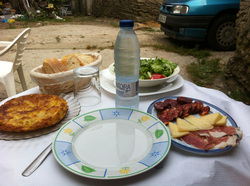 Such royal treatment! It was reminiscent of a magical tea party I had been served by my children when they were tots. To think this fantastic surprise was to be ahead for me, when I was sitting on the side of the road, heavy-hearted, five kilometers back, in inns-filled Tricastela.
Tickled that I was truly blessed, Rocia beamed, waved goodbye to me, and went back to resume her hospitolera duties at the refugio. The gray-haired man's family went on to serve me a tortilla con potatas (similar to a fritatta or omelette with potatoes) with a basket of bread. He asked me if I would like wine. I asked him instead for a glass of water. I wanted the meal to last forever, but the time soon came when I had eaten my last bite of ice cream and the family's chickens had all strutted out of the yard.
I paid the Senora for the family's dinner-gift. I gave her a bit more than I could afford, with my funds drying up and my ATM-withdrawal problem not solved, but I wanted to bless her family as they had blessed me.
What kindness! If only I could take their generous spirits back home. I wish I could run an albergue and cook hearty soups and meals for people on spiritual journeys (as well as for spiritual people on human journeys).
Back at the albergue, the air was electric. The place was full. Another dormitory had opened, and the original nine who had arrived before me were in rare form. The Lindsay Lohan in the bunch was very loud but not as annoying as I had prejudged. She was just very happy and made everyone who came into her sphere happy too. I contentedly drifted to sleep to her joking, laughing, and telling animated stories in rapid-fire Spanish.
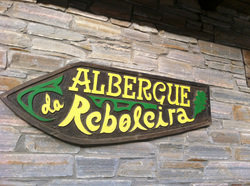 See photo gallery.Dang it. After two good days, this was another bad-pain day. I walked only seven and a half miles, albeit it was mostly all uphill-- but the pain was bad. Moreover, blisters had begun forming again. What the heck? I thought my skin had callused and that I was past that. On a good note, the wrist tendonitis I had developed a couple days ago from flinging on my backpack was less sore (making room for a new pain to crop up). After being frightened by bulls walking toward me (both times they were herded away from me, but they scared me when they noticed me and walked toward me with their pointy horns), I knocked off in Fonfria in the early afternoon. Albergue da Reboleira was a terrific surprise. I would highly recommend it (except that they charged for WIFI). It had a bar/cafe with outside tables; an inside lounging area with couches for reading or playing games; excellent wooden bunk beds with thick, firm clean mattresses; and nicely laundered pillowcases; two individual showers with sinks and toilets each for men and women; a good area for hand- or machine-washing clothes; and a grassy yard for hanging them. I was able to rest, shower, do my laundry, relax in the sun next to a dog-friend, eat a cheese sandwich, and fish a fly out of a glass of Estrella Galicia without feeling awkward or conspicuously solo. And this, outside the refugio alongside a dozen French teen scouts and their scout masters who were goofing around; a couple bicyclists who were studying their route maps; a lady in a pink t-shirt who was talking (in a man voice, I might add) on her cell phone; a girl in a matching pink t-shirt who was fidgeting with her fanny pack; and a middle-aged single gal who was looking like a middle-aged single gal. (You would think that we solo women would hook up, but we do not. There were those who did early on, but, by this point, the rest of us seem to have accepted our uneasy appearances on The Camino and surrendered to the fact that our journeys will be inelegantly alone.) That said, I have become more comfortable on the Camino in general. I have a routine with my showering, laundering, and packing. As soon as I arrive at an albergue, I spread out my sleeping bag, unpack my clothes for the next day, and pull out my mesh laundry bag that already has a small bottle of baby shampoo, a towel, and a rinsed-out soap sheet from the prior day's laundering to use as a facecloth while showering. I hang those items about my shower and put my disrobed clothes right into the mesh bag for laundering after my shower. Having this down so exactly, I am no longer nervous showering with others even when there is no shower curtain. (I had brought a sarong on the trip to use in case there were no shower curtain, but I unloaded it on the first day to lighten my load.) After showering and hopping into my clean clothes, which I sleep in and wear the next day, I take the mesh bag straight to the laundry area, then hand wash and line-dry the clothes. Same routine every afternoon. * * * I was unsure what country the black man who fixed my sandwich came from, but he was very kind and called me "Lady" instead of Señora. Before him, I only had seen two black people on the entirety of the Camino de Santiago: a man who was standing on the Pilgrims' Monument hill with the windmills, soliciting people to stay at his albergue in Puente La Reina (which I should have done), and a man who was walking between Cizur Menor and Puente La Reina with his French wife, while pushing a screaming baby in a carriage up a very rocky trail. I had met a lot of black women in Paris though. All had beautiful dispositions and every one of the women had short-short, cute, curly hair and an adorable personality.
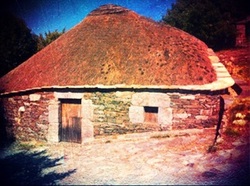 See photo gallery.Having spent the morning sniffing honeysuckle, mint, zinnias, and hydrangea, and hiking past hollyhocks, sunflowers, and lettuce-corn-and-kale gardens, I watched a man in La Faba push his wheelbarrow of potatoes uphill from his garden to the village center and wash them in the town water fountain; I waited while an elderly woman herded her pigs down the road into her yard; and, farther down the path, I ate an orange and cookies in a raspberry patch with the bees before quickly "visiting the bushes" (knowing full well that those traveling the higher road likely could see me if they cared to look). I had a big mountain climb, but crazily I had grown to love the uphill climbs, because my foot did best when it was in a flexed position. I did not use my crippling-crutches (I mean trekking poles), bandages or braces. Instead, I let my body find its natural balance. It was terrific not to hit my nose, forehead, and glasses with five-foot batons every time I swatted at flies. I crossed into the Galicia region early in the afternoon and walked into O'Cebreiro (pronounced Oh-thay-bray-air-oh) shortly thereafter. After showering and handwashing and hanging my laundry, I wandered through O'Cebreiro's little stores in its 15th Century stone buildings that had once been a part of the monastic settlement where Queen Isabella had stayed during her pilgrimage to Santiago in 1486. O'Cebreiro was Celtic in origin and was a very spiritual mixing of Celtic mysticism and Catholicism. Celts believed in "thin places," and I was surprised to discover a thin place between the earth and the spirit realm in O'Cebreiro. Late afternoon, I went inside the stone iglesia (church) to take a look around. I had peeked into the little baptismal chamber and had just noticed the confessionals, when this sense of God's presence leveled me. I found my way to a pew and sat. Tears slowly rolled down my cheeks. (Having no hanky, I kept wiping my drippy-nosed-hand on my sock.) Photo-snapping tourists faded from my periphrea, and I sat basking in the light of God's glory and grace. Every time I started to move, it was as if God would press my head against His shoulder to soothe and comfort me. I do not know how long I sat like that. When I opened my eyes, the church had filled. All but me were standing, and a mass had begun. I understood very little of the mass, but I much enjoyed the rich ceremony, and worshipped the Lord with the others. * * *
After the mass, I had a meal of caldo gallego (a white bean soup, with potatoes, onions and turnip tops, in a pork broth), grilled chicken with potatoes, flan, and cold vino tinto, (having learned the day before that the reason the wine was cold was because it often had cold [sometimes sparkling] water added to it to dilute its strength).
Before bed, I brushed my teeth and zipped the pants back onto my convertible black shorts. It was cold in Galicia, as I was nearing the Atlantic Ocean, and the Galician mountains were the first things the cold winds hit coming off of the ocean.
I went to bed that night thankful for The Second Good Day and for the beautiful "thin place" experience that had insulated me as if I were an infant blanketed in her mother's love.
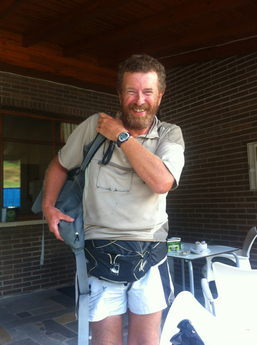 See photo gallery.I was miserable when I was in Astorga. I tried to sleep the whole time, but my foot pain would not let me. Moreover, when I did sleep, I had very disturbing dreams. I also had been unable to withdraw cash from any ATMs, despite my having used numerous supposedly authorized Wells Fargo-Visa locations. But then this day was a turn-around day! I started walking again. I walked about nine miles, and, though I again was unable to walk by nightfall, I, in the meantime, had become more hopeful. Mid-morning, the bus driver dropped me off on the outskirts of Villafranco del Bierzo. I did not know where I was. It was the first time I had been dropped off by a bus where I did not know my way too well. Usually in the center of every town there would be a main cathedral that I could see from the bus, but this time I had seen no cathedral. Eventually, I picked up the Camino trail and began following two peregrinos. It was unusual for me to stay in a pack of people, because of my slow pace, but the boy in front of me had seemed to be limping himself. At one point, I even passed him and began following the other man who was a quarter-mile ahead of me. I followed the man for a couple of miles, then, when I had nearly caught up to him and he had stopped to cross the highway, I hollered out an " Hola." He waited for me, and we walked on together. Henri was a French anesthesiologist. Meeting him at that particular time and spot was quite reassuring to me and was the beginning of what I call The First Good Day. After having been so miserable and in such pain throughout the middle portion of the trip, meeting a French pain specialist then and there was remarkable and renewed my faith in God and in the Camino itself. Furthermore, on the Camino you do not chit-chat. Sure, there is the quick " Hola," " Buen Camino," and " Buen Viaje" in passing, but, when you hold a real conversation, one of the first questions that is always asked is "Why are you walking the Camino?" which immediately takes you to the heart of people's matters. It was no different with Henri. I, of course, spoke no French, but his English was pretty good. He was a married cancer survivor who very much wanted to go to Africa where his daughter practiced medicine. We talked and talked mostly about faith in God and other spiritual matters. The time passed quickly and a few hours later I realized that I hardly had been aware of the pain in my foot. I stopped for the day at an albergue in Portela de Valcarce. Henri had his meal there but then walked on. When we parted ways, I prayed aloud for him, asking God to give him clarity for his future decisions and to abundantly bless his way and marriage. Adding more joy to the day: the albergue was very clean, with a toilet, sink, and shower in a room that I got all to myself. After spending nights with so many in a room and showering and eliminating in stalls with men and women alike, the privacy was a great luxury. Furthermore, while walking today, I kept seeing this sign of a vehicle sliding on the highway under which it said " en heladas." Thinking that helado meant ice cream, every time I saw the sign I would laugh outloud and say, "Ha ha! Slippery in ice cream!" Mostly the day was great because, having bussed through the middle section and having broken up the remainder of the trip over three weeks, the one hundred six miles that I had left to walk now seemed doable.
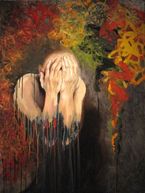 See photo gallery.My time in Astorga was my whale-belly time, a true separation from my known world and self. I was extremely depressed and could not see how I could complete my journey. At that point I was transitioning between worlds and selves. What I did not realize was that, as I lie miserable on a bunk in a municipal dormitory, a separation was being made between my old world and old self and my potential for a new world and new self. What I did not yet know was that, as my hope bled out, the experiences that were to shape my new world and self had already begun with this dark, unknown, and frightening experience. I found myself desperate to undergo the metamorphosis which indeed had already begun.
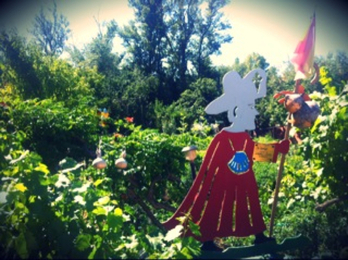 See photo gallery.Today was the worst day of the whole trip. (Hang with me, it will get better. The turnaround will happen in two days!) But this Twelfth Day of the Walk was a dirty-rotton-no-good-very-bleak day of miserable, horrible, painful, distressing hopeless walking. I left Leon at 6:00 a.m. and walked awhile in the dark. It started out great, as I excitedly walked passed a zoo where it sounded like the animals were being led by banshees and were rioting inside. Then, about an hour and a half later, something strange occurred. I had pain in every bit of me: fingers, neck, hands, arms, back as well as all the usual places. I guess the reason I was experiencing this all-over pain, and had not before, was because this was the first morning I had been cold. And I was cold. And stiff. And sore. I took off my pack and sat in the sun, warming my bones, with a nice hot cup of cafe con leche and some churros. I then bought a couple of ham sandwiches to take with me and was off again. But I took a wrong turn which put me on one of the other routes and put the albergue ten kilometers beyond where I had planned to stop and sleep. I was in so much pain. I cried and cried. I hobbled on one foot, and then the other foot burdened by the offload, swelled and screamed as well. There was no escaping this hell. I had to just keep moving. A little old man stopped me, saying something about my bad foot, but he then encouraged me by saying that " poco a poco" I would make it to Santiago. Limp. Limp. Limp. Limp. Limp. Others would stop and ask if I were okay. A man from Arizona offered me a pain pill. Other than that, there was not anything anyone could do. There was no rescue. I had to just keep walking. Eventually, I got to the municipal refuge at Villadangas del Paramo. Men and women were crammed together in one room. I had the bed closest to the bathrooms, so I was privy to the 'activities.' A couple of miles before the albergue, I had been passed by an unfriendly guy with long hair. He looked like Fabio on the cover of a dime store romance novel. He was wearing rust-colored gauchos, a white cotton pirate blouse and a straw hat. I thought, "Wow, he is really getting into the part. That is some get-up." When I arrived at the albergue, there was a note posted on the dormitory wall (spelled wrong) that said, "Fres chicken soup with paprikas 1 Euro plate." When I stepped out of the shower, I smelled the chicken stock boiling, and who should be cooking it, but Yanni-In-The-Gauchos. He smelled pretty bad, and I wondered if he had washed his hands. I later learned that his name was Ka'l Ma'l and that he was Transylvanian. When we were hanging our laundry outside, he told me how his bank had twice taken auto withdrawals from his account, despite his having instructed them not to, and how he was having to cook meals at the albergues in order to keep going, because he did not have any money. He said he had started in St. Jean Pied de Port on July 10th and had had bad luck the whole time, starting with his having lost ten euros when he pulled out his identification in Bucharest, to his puffy pirate shirt never drying, and him always having to wear it wet. A couple of hours later I sat down to a bowl of his awful soup. It basically was just a bowl of broth with onions, carrots, parsley and bones. Ka'l Ma'l ate with me. He seemed very sad. I guessed he was about thirty-eight. He said he had a thirteen-year-old son in Transylvania, and that he was walking to Finnestere hoping to be reborn there, "to return a new man." He said his father had died seventeen years before without ever having seen the ocean. Ka'l Ma'l had brought dirt from his father's grave in a bottle to put in the ocean. He planned to then fill the bottle with ocean water and pour it on his father's grave when he returned home. Others in the albergue (including the hospitalero) laughed at him. I was moved by his story and by the fact that we each had our hardships on the Way. He was humiliated by his having to cook and clean his way to Finesterre. When I stood to carry my bowl to the kitchen, he said, "No, sit. What is one more plate?" I thought, "No, let me serve him instead." So I went into the kitchen and did the dishes. I then went to sleep early. Ka'l Ma'l's cot was next to mine. Before tiptoeing out of the albergue early the next morning to try and find a bus to Astorga, I put ten euros on his pillow. I hoped to help him on his way. Who knows, it might have been a big bamboozle, but I do not think so. I do not think he was someone who had necessarily done a lot of good in his lifetime, but I believe he was someone who wanted to. At one point, he had asked me about my faith and about how to find God. I had not said much. He was the third person who had expressed to me a desire to find God on the Camino. He was the third person whom I very likely had prevented from seeing God. As I rode the bus the next day to Astorga, I asked God to forgive me for the times I had closed others' eyes to life, to optimism, and to hope; for the times I had kept others apart from His love through the din of my folklore and my distorted views.
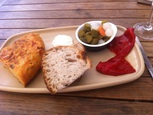 See photo gallery.This morning I took the 6:50 bus from Burgos to Leon. Having skipped the Meseta by riding busses from Logrono to Leon, I chopped two hundred miles from my walk. I arrived in Leon about 9:00 and had breakfast (a quarter pounder with cheese, fries, and a Coke) at a McDonald's! I then found my way to the tightly organized Albergue Santa Maria de Carbajal, run by Benedictine sisters, which opened at 11:00. Outside, I hung on the line the clothes in my bag that I earlier had packed away damp. I took a nap without showering, then figured out a walking plan for the rest of the trip. After a while, I showered, got back into my same purple shirt and light zip-off pants, then put on my Sanduk shoes and walked across the plaza for dinner. I had a tortilla con potatas with pimentos and a glass of vino tinto with pinchos (pickled onions, olives, cucumbers, & carrots). Before going to bed, I sat in a large elm's shade outside La Santa Sed and tasted a milky, yeasty, Palomeres that was also from Leon.
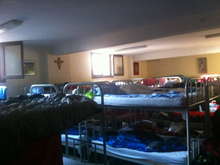 The bunks in the albergue were packed together so tightly that it was as if the woman to my right and I were sharing the same bed. I wished for her sake I had been in a better mood, but, sadly, I did not want to talk to her or anyone. I had noticed in the courtyard and at dinner that she seemed to be walking with her son who looked a year or two younger than mine.
I fell to sleep hoping to feel better in the morning.
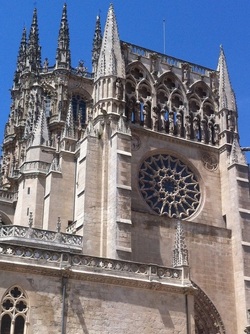 See photo gallery.I left the albergue by 6:30 a.m. After having a cup of coffee and a croissant, I crossed through giant-leafed vineyards into the renown Rioja region on my way to Logrono. I hoped to find a bus in Logrono which would take me to Burgos. It had rained during the night, so the fields were damp and cool. I tiptoed around puddles and tasted green and purple grapes, wishing it had been a bit later in the season so that I could have enjoyed them at their plumpest and sweetest. Outside of Logrono, I got a sello (stamp) in my credencial (pilgrim's passport) and purchased a couple of small souvenirs from Felicia, Logrono's gatekeeper so to speak. Eventually, I made it into Logrono, found the bus station, purchased a ticket, and, after a couple hours' wait, traveled to Burgos. As you probably figured, I was miserable in Burgos. I skipped dinner because I was in pain and did not want to walk to find food. I did, however, tour the nearby Burgos Cathedral, because I could not have come that far and not have seen it. I was sorely discouraged, but I controlled what I could control and genuinely did what I could to make the best of my difficulties.
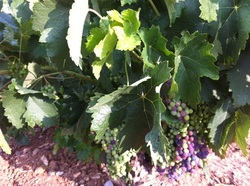 The Burgos Cathedral was indeed majestic and the grandest thing I had ever seen. I wondered how the Cathedral in Santiago could possibly top it. I was saddened, however, to see what had once been a sacred place overrun with tourists. I had to work on my attitude, because I found revolting everyone who held their phones up and took pictures of themselves every-which-where. It seemed as if their lives had been reduced to a series of photo opportunities. But, then again this revulsion came from a crabby, miserable lady. At least the people taking pictures of themselves were smiling.
While in Burgos, I saw the dark-haired Matt Chism/Dave Thaxtonish guy who had been on the same train as I from Bayonne to St. Jean Pied de Port. I had seen him at one other albergue along the way as well. He was still looking as lonely, awkward, and miserable as I.
While in Burgos, I wished I had gotten to know Pillar, a woman I had spoken with at the albergues in Orisson, Arre, and Vianna. I was in her city of origin now-- the city where she would finish her Camino. She had spoken only Spanish, and it had seemed too hard when I was exhausted to try to communicate, but, there in Burgos, I asked God to bless her and hoped she would find what she was seeking on the Camino.
See photo gallery.Before writing about the walk to Viana and telling of the friendships I made with my Danish and German roommates there, let me write a bit more about my time in Sansol with the Spaniard, the German, and the Silly Old Dutchmen. If I had gone on a little farther to Torres del Rio, instead of stopping at the albergue in Sansol, I would have had my pick of three nice albergues and could have enjoyed a lively cafe scene, but, having been thrashed by the end of the day and replete with suffering, Sansol was as far as I made it. I was greeted at the Sansol albergue by (what I thought was a teen-aged boy, but whom I later found out was) a forty-one year-old Barcelonian school teacher named Antonio or "Tony." Tony, a very beautiful and lean, tiny man with turned-in incisors, told me that the hospitalera had gone to care for her elderly father and gave me the choice of two dormitories to sleep in. It looked like the Silly Old Dutchmen had already settled into the first, so I chose the second. A bit later, Tony moved his belongings from the first to the second as well. He said it was because the second was "airier," but, as the night wore on, I understood better that he did not want to be in the same room with the Silly Old Dutchmen. Tony, a disciplined peregrino who walked great distances from sunrise to noon each day, had arrived in St. Jean Pied de Port at the same time as the Silly Old Dutchmen. He had met up with them time and again at various albergues along the way and knew firsthand of their shenanigans. He whispered to me, "It is all one big party with them," and "They smoke marijuana." About 6:30 p.m., after showering, doing my laundry, and otherwise puttering around the albergue, I set out to find a meal. I went to the one and only place in town: a grungy dive. Scuzzy, aka Long-Haired Stringbean Man (who was gone, Gone, GONE on something) was tending bar and Nearly-As-Greasy-Haired Dumpling Woman was in the next room cooking. (I chose to believe that Dumpling Woman's hair looked "damp" because she was "warm.") When I entered the bar, I saw two of the three Dutchmen sitting at a table with Christian, a German man whom I had met at the albergue in Villa Mayorga. Christian and I had passed one another on the road at various times, and he, seeing me struggling with my foot, had often asked how I was doing. Christian and the Silly Old Dutchmen were all speaking in German. They had had plenty to drink and, needless to say, were very merry. As I walked in, Tony quietly pulled out a chair for me at his table, and said, "Please come sit down." I realized later that he was trying to save me from the Dutchmen. Tony ordered for me in Spanish (thin beef loin, fried potatoes, and salad) and poured me a glass of a Rioja wine. I asked him why red wine in Spain was served chilled. He did not answer why it was cold, but he did explain that this wine was a (in his opinion not-very-good) young wine, that Crianzas and Reservas were aged three and five years, and that the plants' roots were crushed and included in the making of the Rioja wines. We talked about Spain's complex economic problems and a few other topics, but mostly, I texted my family, and he talked with his, on our phones. After dinner, Tony left to visit a church. I was about to leave as well, when the Silly Old Dutchmen and Christian, who were now at a table outside in the rain, persuaded me to sit down with them and have a glass of wine. Tony, who was partway down the road, threw his head back and laughed as he watched them suck me in: "Sit down and have a Rioja," they charmed, "It will make you sleep better!" They poured me a small glass, and we chatted for a while. They were goofy because they were so well-lit. The Second Dutchman, Hank, was real Devo-ish with the coolest, trendiest glasses. When I asked the Third Dutchman Jaap (which apparently means James in Dutch) what he did for a living back home, he said he was a director of a school. I was amused and amazed as I imagined this toasted man, who kept referring to America as "the other planet" in his dignified profession. I should not have been surprised that they were so nutty. When I had first encountered them a ways out of Sansol, they were "full of spizzerinctum," as my dad used to say, even then. Jaap, then marching in the rear, kept loudly proclaiming, "I am finished! Huh. I am finished! Huh. I am finished!" and telling the First Dutchman, whom I never actually met, "You must put me on your back and carry me the rest of the way!" Back at the table in the rain, they insisted that I go to Logrono the next day with them, "We will all taste the wines of the Rioja region together!" I told them, no, no, I could only go as far as Viana because of my foot and slow pace. Jaap told me that was nonsense, pulled off my shoe, and inspected my foot (while the German, attempting nonchalance, pulled out his camera and took pictures of my four and a half toes). Eventually I convinced them that I did in fact have bone issues, not just blisters, and would not be going on to drink wine with them in Logrono. About then, Jaap made an exaggerated gesture and spilled his entire of glass of wine on my shorts. Christian then spilled his wine on his pants. As I headed back to the albergue in the rain, I could hear them laughing and carrying on about our "sister stain memories." It continued raining throughout the night, and, though the sun was shining when I set out the next morning, walking through the damp fields, with the doves cooing so loud and so long, was like walking through an exotic tea shop with a kitten purring in my pocket. Truly, I found the best part of the trip to be all of the smells! Some I had not smelled since I was a child. I had a very good day of walking from Sansol to Viana. I did not go far but was stronger. I walked among vineyards, pine forests, and olive and almond groves. My feet were extremely pained by the end, but I had pounded the trail harder and had used a faster stride. That said, I was glad that the bar with the pilgrims' menu was only fifty meters from the albergue, as I could not have hobbled any farther into the city for dinner. 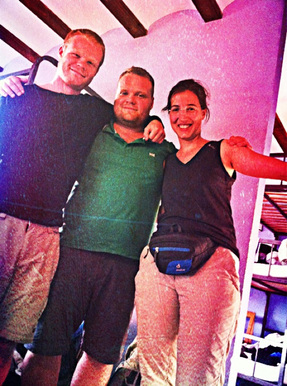 The bunks in the albergue were stacked three high and had filled by early afternoon. In my room, from London, were Lorenzo (a friendly but opportunistic spoiled prig who was on his fourth Camino because he had "nothing else to do") and his so-skinny-he-had-to-have-a-tapeworm companion David. Listening to Lorenzo expound about anything-and-nothing-at-all made clear the line in FOUCAULT'S PENDULUM, when Belbo says, "Ma gavte la nata," which means something like 'unplug the cork, and let out the wind.' Also, in the room, from Germany, were Ana, who bunked above me; and, from Denmark, two brothers Rass and Tjelle.
I wound up having a lovely time with Rass, Tjelle, and Ana. We talked for hours. It was such a lot of fun! Poor Ana's foot was so badly swollen, though. She had planned to walk to Santiago, but would be returning home the next day. She studied theology in Germany. Rass studied Philosophy in Copenhagen, and I am unsure what Tjelle did. I think he had studied to be a teacher, but I do not believe he was one. He was so good and kind like Jaust in the Sheen-Estevez movie. They were such terrific boys. They had asked me to join them at the cafe for dinner, but I had declined. I was so tired and could not believe that they seriously would want to have a real conversation with an old mom like me. Back at the dorm, though, the four of us had the best time. We talked about things that really mattered. Something about our all being so broken down physically and emotionally made us start the friendship from a different place. What an unlikely quartet we were: a twenty-four-year-old, a twenty-six-year-old, a twenty-whatever-Ana-was-year-old, and a forty-eight-year-old me. Suffice it to say, it was a very special evening at the albergue.
|













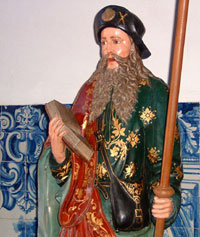
 RSS Feed
RSS Feed